Opened 15 years ago
Closed 15 years ago
#232 closed defect (fixed)
Unrealistic retrievals in IT-1DVAR-04/6
| Reported by: | Ian Culverwell | Owned by: | Ian Culverwell |
|---|---|---|---|
| Priority: | normal | Milestone: | 5.0 |
| Component: | ropp_1dvar | Version: | 4.1 |
| Keywords: | Cc: |
Description (last modified by )
ROPP5 DRI highlighted an issue with these tests: delta T > 10K at 52km for the 5th profile in IT-1DVAR-04.nc (= COSMIC obs, UKMO bg) - see orange profiles here: 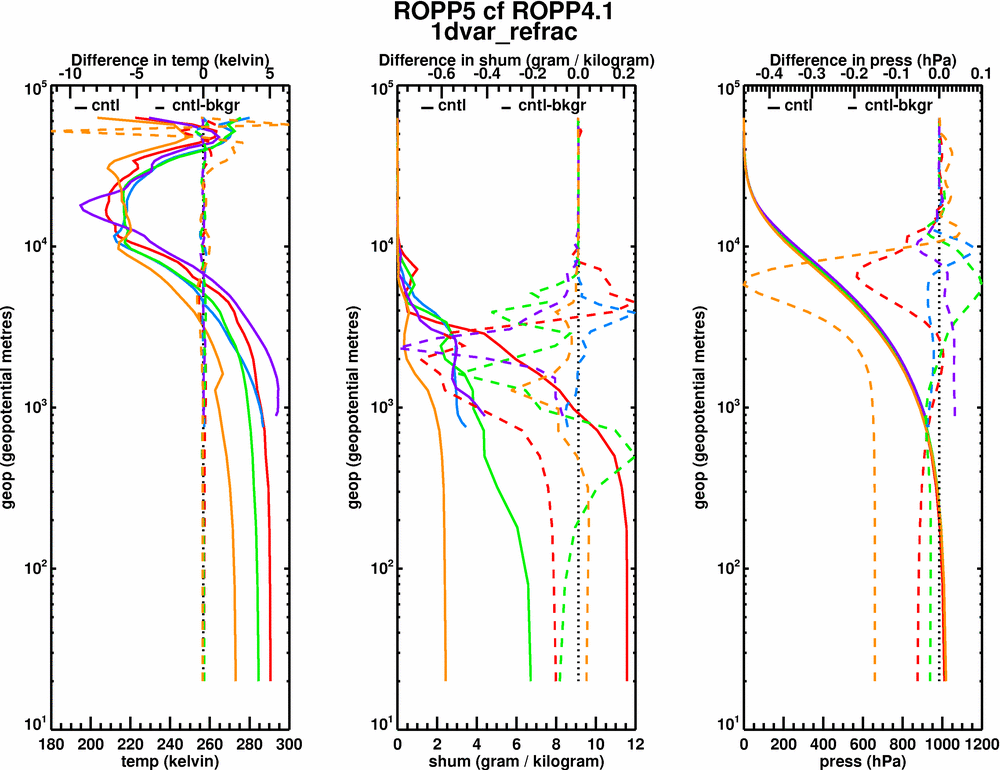
There was nothing apparently odd with the data or the bg for this profile, although it (like the 1st) is sited in the S Hemisphere (~50S), which has higher bg err covs - see red line here: 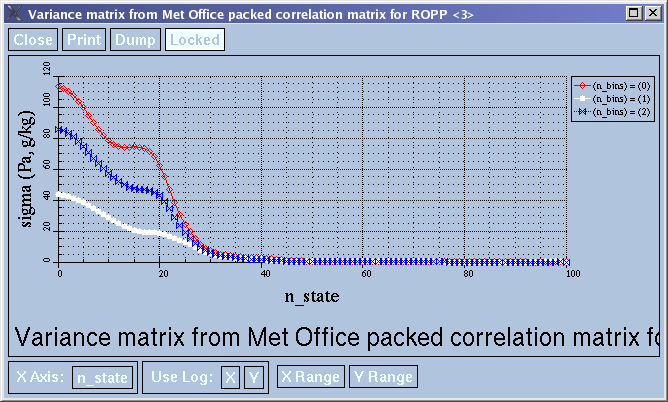
So I just reduced the SH errors to be the same as in the tropics (white line above), which implies a reduction in the sigmas by about 2/3. (This requires setting bg_covar_method= FSFC in the metoffice_refrac_1dvar.cf config file, and editing a local file.)
This had little effect. So I artificially further reduced all the bgerr covs by a factor of 10 above 35km. The result is shown here: 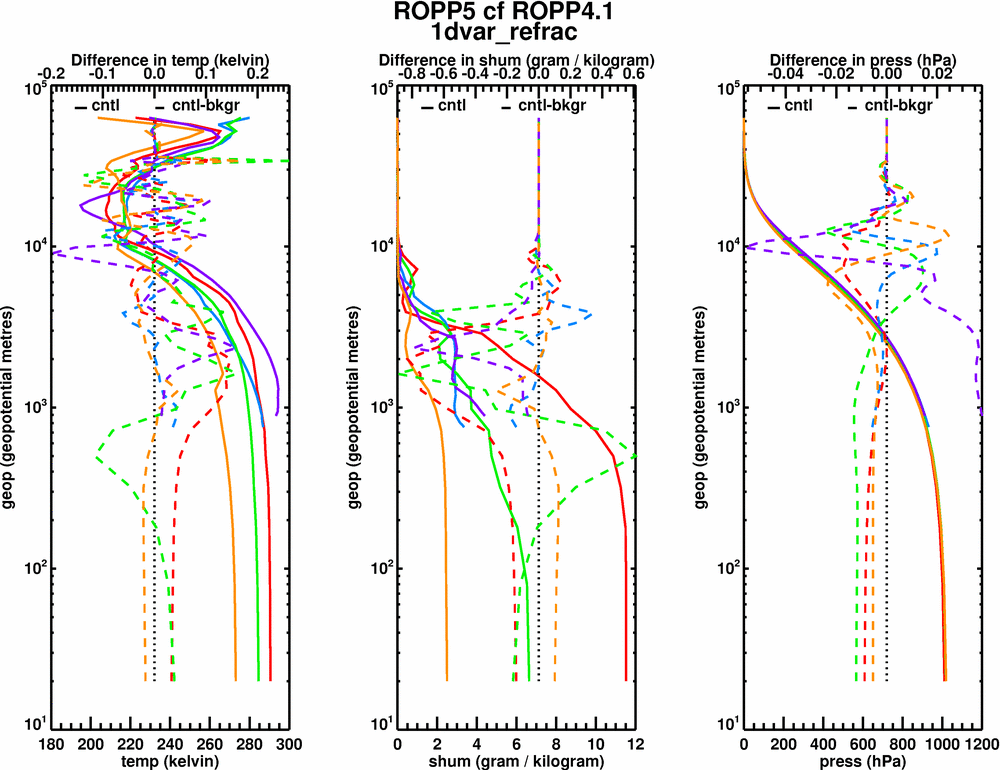
Clearly, much more reasonable temp changes: < 0.3K.
This is not to say that these are the correct bg err covs to use in this case; merely that a reasonable change in them can produce drastic change in the retrievals. In other words, this is a data issue, not a ROPP issue.
Interestingly, the original temperature increment is much reduced (to ~3K) by using the non-default LevMarq minimiser, rather than the default MinRopp - see here: 
Again, it's resolved by reducing the bgerr covs at height:

For bangle, we have to reduce the bgerr covs by a factor of 10 at all heights to change this: 
(temp incs of 1-2K)
(temp incs of < 0.1K).
But it can still be done.
So I suggest the root of the problem has been clarified.
Attachments (15)
Change history (24)
by , 15 years ago
| Attachment: | Test2_minropp.gif added |
|---|
comment:1 by , 15 years ago
| Description: | modified (diff) |
|---|
by , 15 years ago
| Attachment: | Test2_levmarq_reduced_bgerrcov.gif added |
|---|
Test2_levmarq_reduced_bgerrcov.gif
by , 15 years ago
comment:2 by , 15 years ago
| Description: | modified (diff) |
|---|
comment:3 by , 15 years ago
| Description: | modified (diff) |
|---|
comment:4 by , 15 years ago
| Description: | modified (diff) |
|---|
by , 15 years ago
| Attachment: | Test2_bangle_reduced_bgerrcov.gif added |
|---|
Test2_bangle_reduced_bgerrcov.gif
comment:5 by , 15 years ago
| Description: | modified (diff) |
|---|
by , 15 years ago
| Attachment: | Test2_refrac_original_obs_cov.gif added |
|---|
by , 15 years ago
| Attachment: | Test2_bangle_original_obs_cov.gif added |
|---|
by , 15 years ago
| Attachment: | bangle_sigma_original.png added |
|---|
by , 15 years ago
| Attachment: | refrac_sigma_original.png added |
|---|
comment:6 by , 15 years ago
There remains the question of why one particular retrieval based on refractivity:
suffers such large T incs at 50km than that based on bangle:
A clue comes from the observational covs (in the obs file). The bangle sigmas flatten off to 6e-6 above ~25km (note the log scale):
The refrac sigmas have a curious structure, in which they increase between ~25km and ~30km, and then monotonically decrease to very small values above:
I do not know the validity of these shapes, but as a sensitivity test, I tried flattening the sigma N's in the same way as the sigma bangles (ie, flat after the local min), thus:
Doing so reduced the T inc wrt background for this profile to much more sensible values at height:
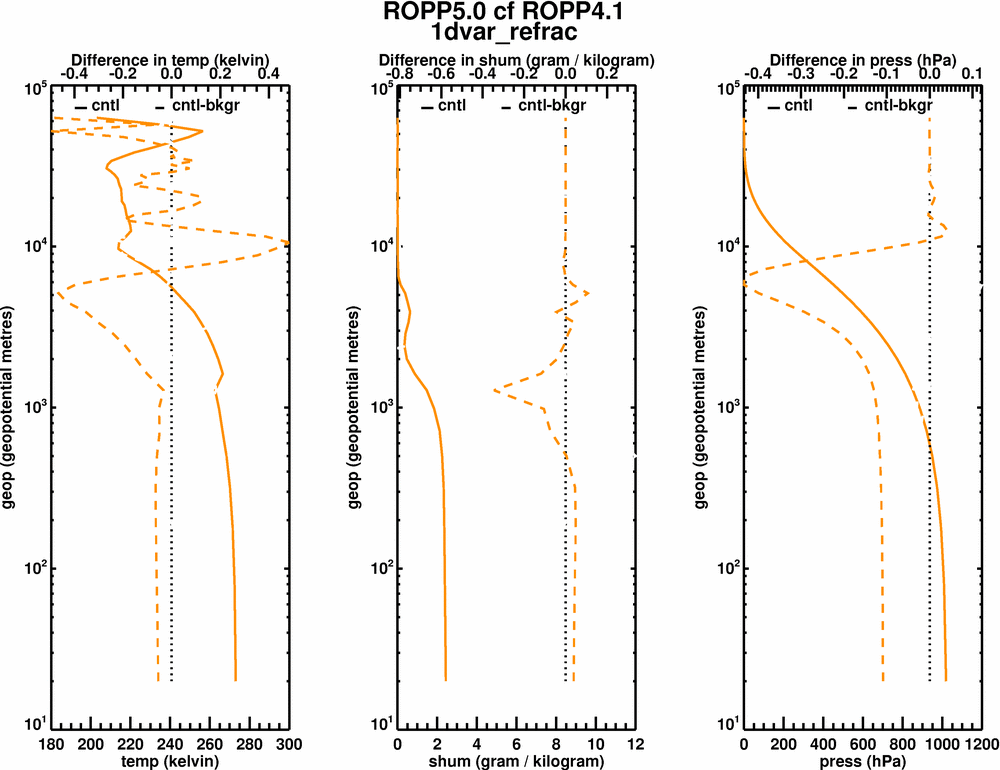 So, this modest difference in the shape of the sigma N and sigma bangle can explain the difference between the two retrievals, which are now quite similar (within ~1.5K, 0.2g/kg, 0.5hPa):
So, this modest difference in the shape of the sigma N and sigma bangle can explain the difference between the two retrievals, which are now quite similar (within ~1.5K, 0.2g/kg, 0.5hPa):
Again: data, not model.
by , 15 years ago
| Attachment: | Test2_refrac_final_obs_cov.gif added |
|---|
by , 15 years ago
| Attachment: | Test2_bangle-refrac.gif added |
|---|
by , 15 years ago
| Attachment: | refrac_sigma_final.png added |
|---|
comment:7 by , 15 years ago
Following discussion at the ROPP5.0 DRI close-out meeting between EUMETSAT and UKMO on 28/6/2011, it was agreed to raise a helpdesk question on the "funny" obs covs used in this test, so I've done so (http://www.grassaf.org/view_enquiry.php?id=74).
comment:8 by , 15 years ago
As a result of this query, Joe Nielsen at DMI has examined the refractivity sigmas that DMI use operationally. (Axel was concerned that the same funnies might be propagating into operational products.)
Happily the operational sigmas have a minimum refractivity sigma of 0.02 N-units, unlike the decreasing values used in IT-1DVAR-04:

(These are generated with the DMI tool/command
1DV_add_obs_error.x $occ -o $occ -attdir $WRKDIR/$year/$day -bgrdir $BGRDIR/$year/$day -outdir $WRKDIR/$year/$day -datadir . -Omod '2%' -sil.
If this is analagous to the ROPP tool/command
ropp_1dvar_add_refrac_error <obs_file> -Omod '2%' -o <out_file> -b <bg_file> -c <corr_file>
then the -Omod '2%' specifies 2% errors at 0km, 0.2% from 12km, with a min of 0.02 N-units.)
The results above strongly suggest that this flattening of the refractivity sigmas will be sufficient to prevent large T increments appearing in the operational retrievals.
Closing the ticket.
comment:9 by , 15 years ago
| Resolution: | → fixed |
|---|---|
| Status: | new → closed |

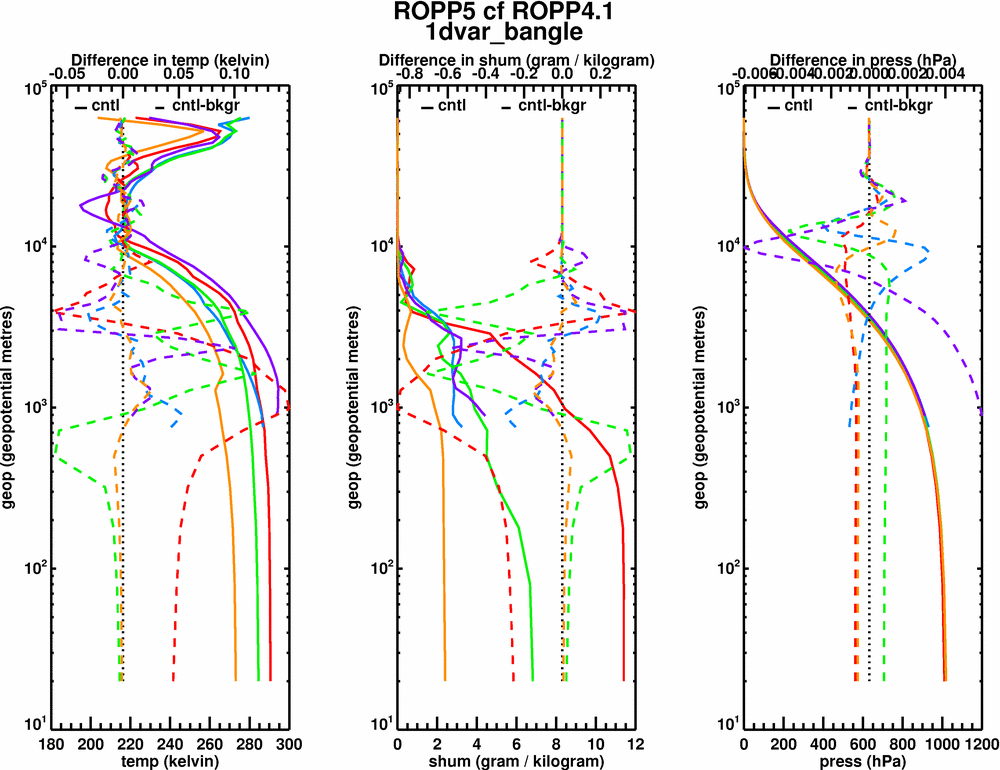
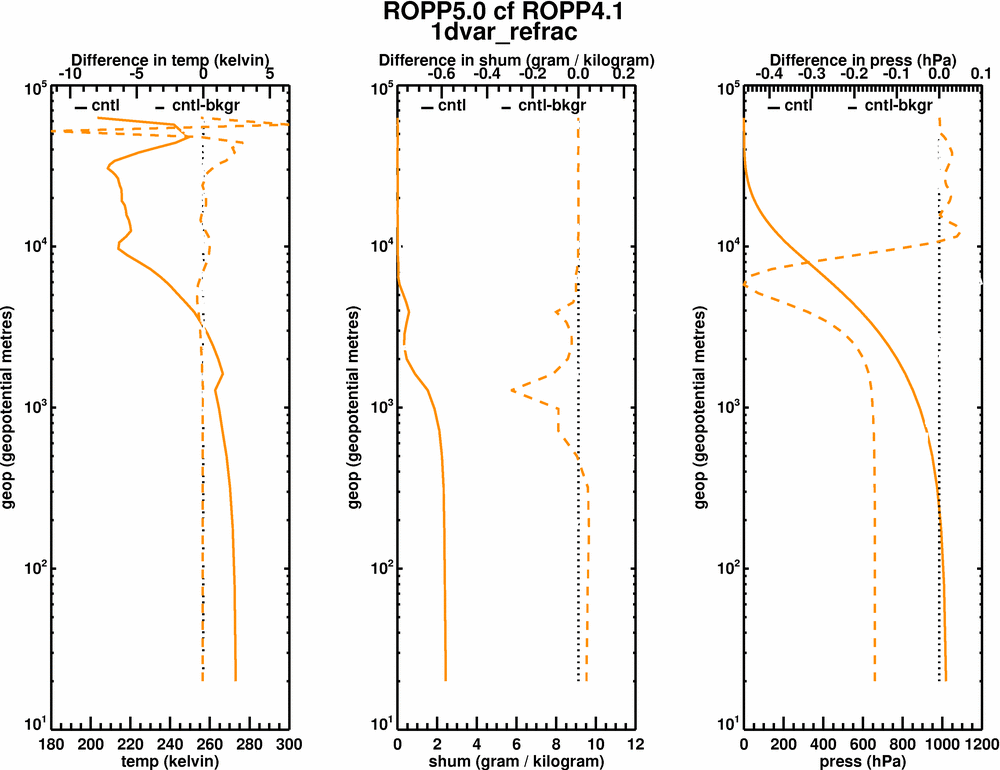
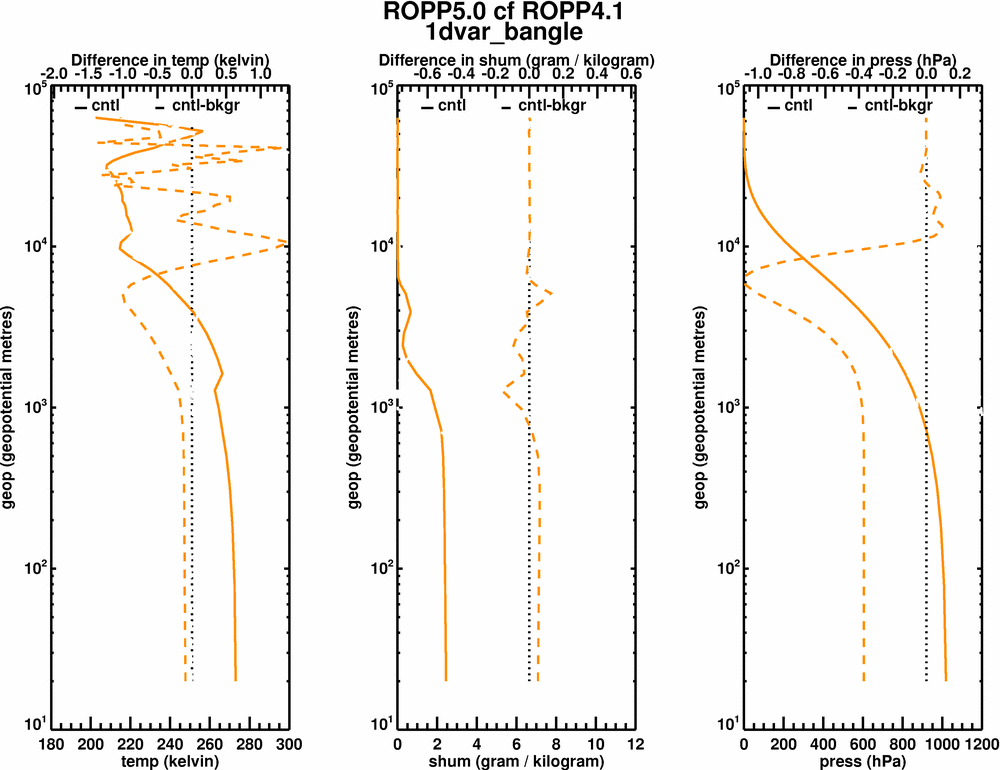

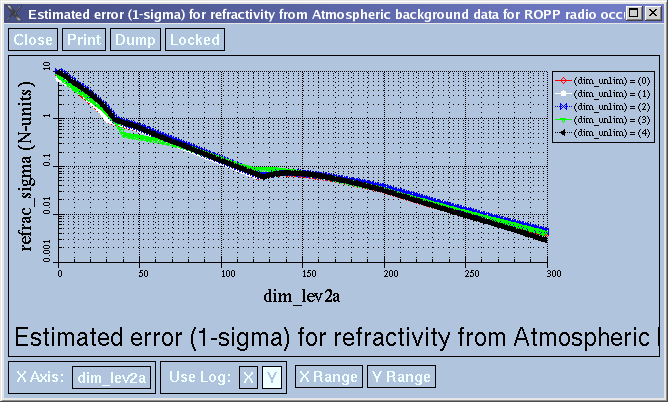
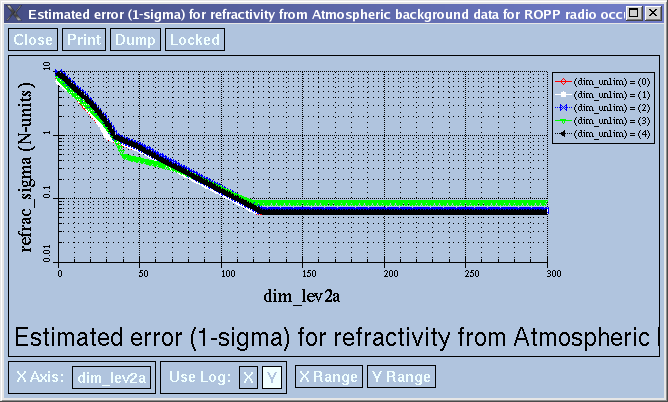
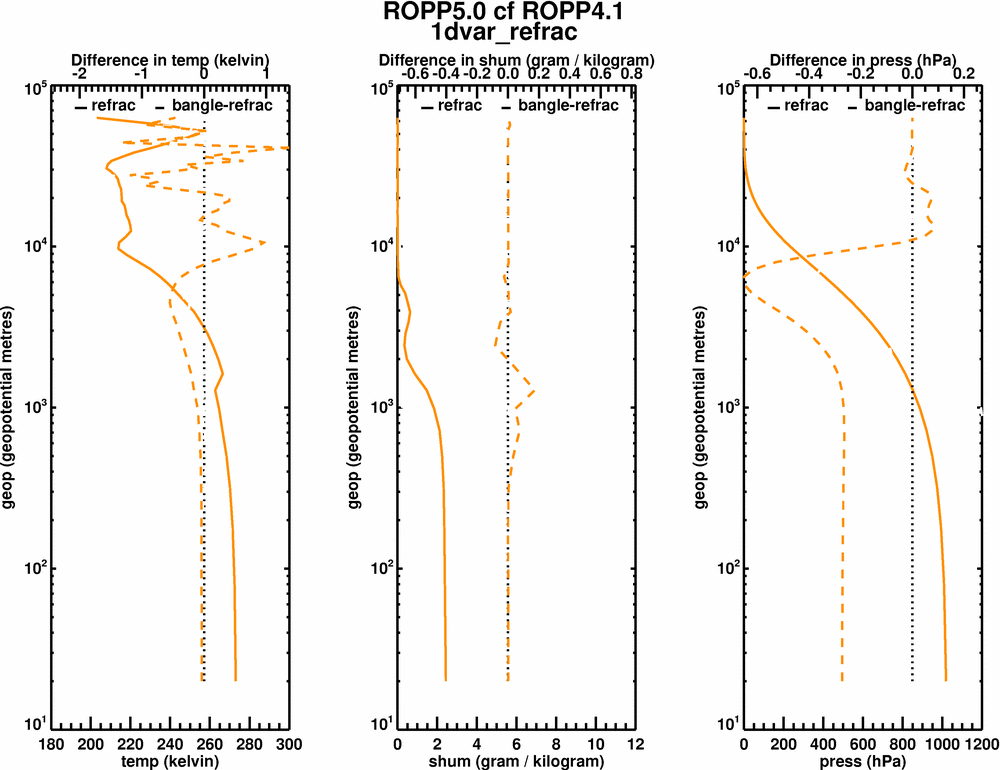
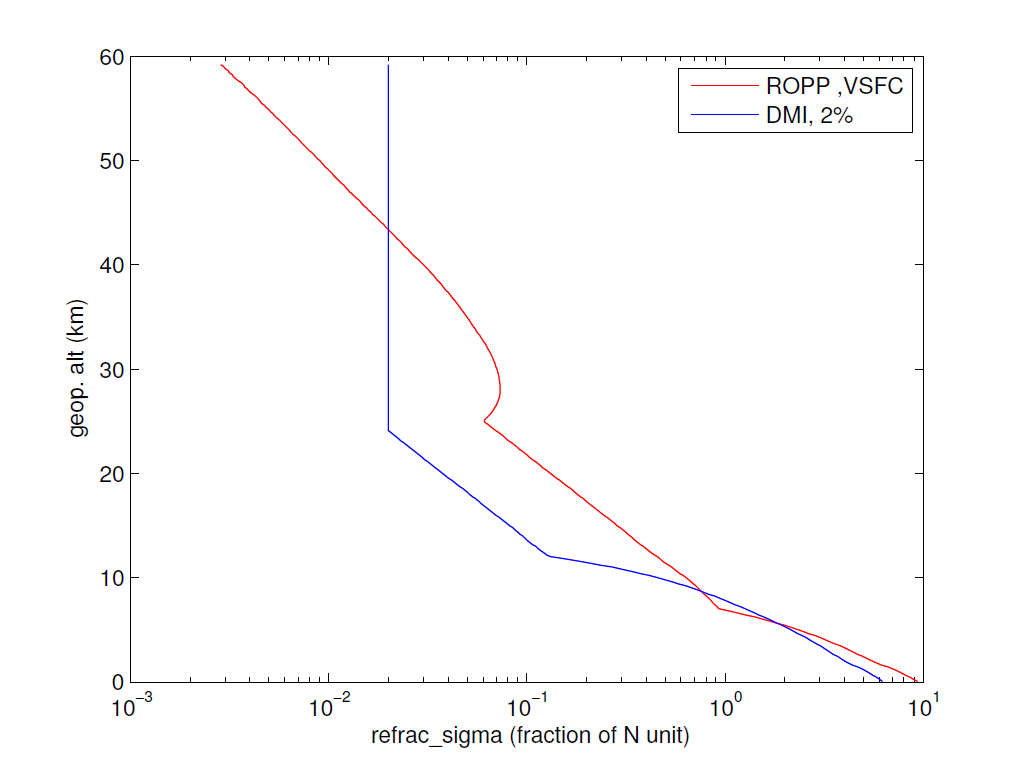
Test2_minropp.gif